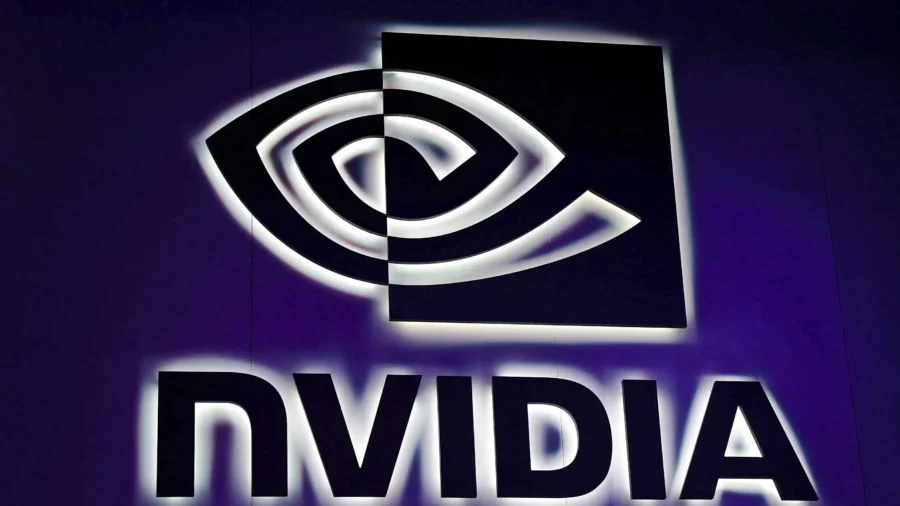AI chip manufacturer Nvidia is set to replace Intel in the Dow Jones Index as the latter’s shares have declined by more than 50 percent this year.
Nvidia will be included in Dow Jones beginning Nov. 8, S&P Dow Jones Indices said in a Nov. 1 statement.
Intel is currently the worst performing stock in the Index this year, whereas Nvidia briefly became the most valuable company in the world last week, dethroning Apple. It is currently the second largest company by market cap, with Intel in the 165th position.
S&P said the index changes “were initiated to ensure a more representative exposure to the semiconductors.”
The Dow Jones is an index of 30 companies, with businesses added or removed from the gauge from time to time. Dow Jones “is a price weighted index, and thus persistently lower priced stocks have a minimal impact on the index,” said the statement.
Nvidia’s stock price rose by 2.91 percent to $139.31 during after-hours trading on Friday, while shares of Intel declined by 1.85 percent to $22.77.
Nvidia shares have surged by more than 181 percent so far this year, while Intel’s shares have declined more than 51 percent.
Nvidia has become a key player in the semiconductor industry because of its chips being used in AI technologies. The company’s shares have risen by more than nine times over the past two years.
In June, the corporation’s 10 to 1 stock split came into effect that made its shares more accessible to investors, thus paving the way for Nvidia to be added to Dow Jones index.
Intel has struggled to gain a significant foothold in the AI chip market dominated by Nvidia, with the front-runner’s chips hard to get and even harder to replace in AI data centers, owing to the processors’ technological edge and the high costs of replacing them.
“Truly insane: Nvidia, $NVDA, just added $100 BILLION of market cap just on the announcement it will be joining the Dow Jones Industrial Average. Intel is being removed after 25 years of being in the index. Incredible,” market analysis service The Kobeissi Letter said in a Nov. 2 X post.
Nvidia joins Dow Jones ahead of the company’s Q3 earnings report scheduled to be released on Nov. 20. Since 2022, Nvidia’s quarterly revenues have jumped from $8.28 to $30 billion by Q2, 2024. During this period, 7 out of 10 quarters have seen year-over-year revenue growth.
In contrast, Intel’s revenues have dipped from $18.35 to $12.83 billion during this period, with 8 out of 10 quarters registering a year-over-year revenue decline.
Strong Demand for Nvidia Chips
Taiwan-based electronics manufacturer Foxconn recently announced the construction of the world’s largest manufacturing plant to produce Nvidia’s GB200 chips used to run AI servers. In October last year, Nvidia said it was collaborating with Foxconn to develop a new class of data centers.
These data centers would power applications including the “digitalization of manufacturing and inspection workflows, development of AI-powered electric vehicle and robotics platforms.”
Nvidia’s graphic chips are also entangled in international conflicts.
The U.S. government has banned Nvidia from exporting powerful chips such as the A100 and H100 to China as such chips could aid the communist regime in attaining AI breakthroughs or building sophisticated computers for its military.
Despite the ban, military entities, state-backed AI research institutes, and universities in China have managed to secure the powerful chips.
Meanwhile, Nvidia is facing accusations that it has monopolistic control of the sector. In July, a group of organizations, including the Tech Oversight Project and the Open Markets Institute, wrote a letter to the U.S. assistant attorney general, saying they would support the Department of Justice conducting an antitrust investigation on the company.
“Nvidia has made clear that it intends to ride the AI wave as long and as far as it can, and its astonishing dominance in GPU accelerator chips—it now holds an 80 percent overall global market share in GPU chips and a 98 percent share in the data center market֫—puts it in a position to crowd out competitors and set global pricing and the terms of trade,” the groups wrote.
Reuters contributed to this report.
From The Epoch Times

